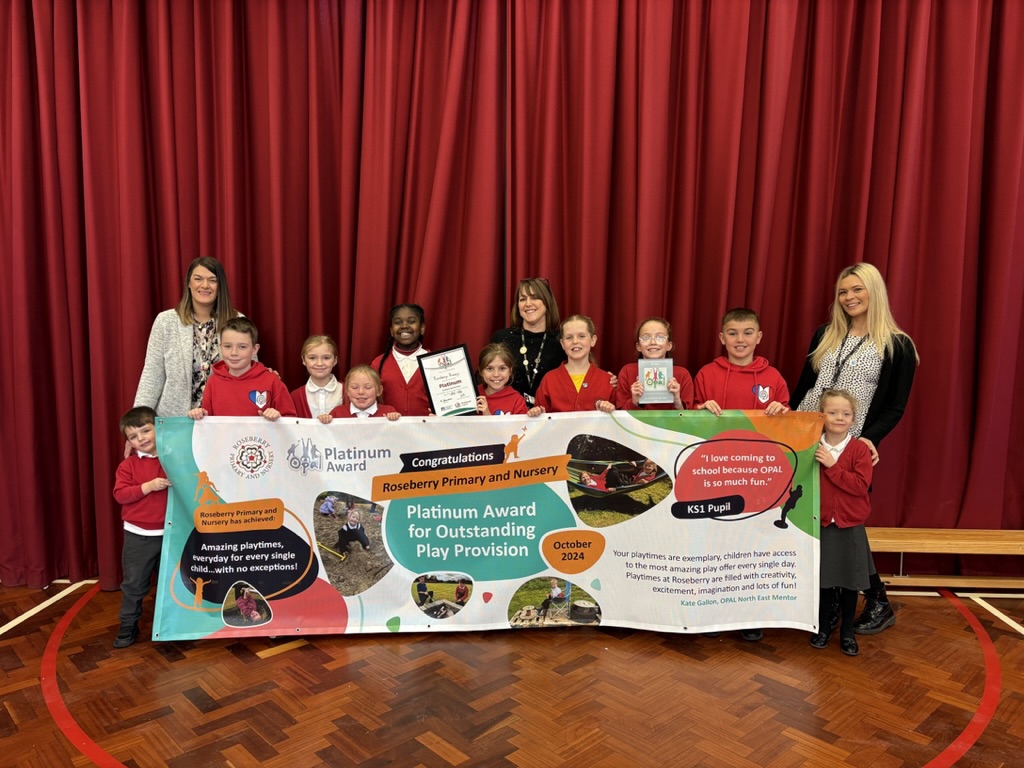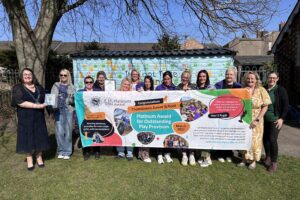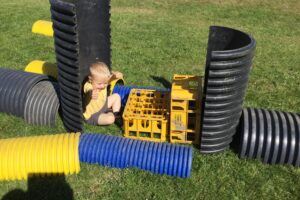
Roseberry Primary and Nursery School, Durham
- Date April 1, 2025
Behaviour issues at lunchtime are very few and far between. It’s as if they don’t have time to argue anymore because they are too busy playing!
Before OPAL, there wasn’t a great deal for the children to do. Football tended to dominate the yard and often led to disagreements between pupils and staff. There was an element of disrespectful behaviour towards the lunchtime supervisors which meant that behaviour issues at lunchtime then had to be dealt with by teachers after lunchtime. Our children all played separately; Reception, KS1 and KS2 all had their own separate yards.
Now, children are a lot happier at lunchtime, you can see it on their faces.
Children look forward to going out to play and they are excited by the activities on offer. There is definitely a happy atmosphere outside.
Children are engaged in a lot more physical activity now than they were before. Football is now not the only sport that is played. We offer a variety of sports on our sports yard including tennis, hockey, netball, badminton and dodgeball. The field is used much more often and children have the opportunity to run, climb and swing, which they didn’t have before.
We have worked hard to ensure that our playtimes are suitable for everyone.
As our children play together from Reception to Year 6, we have seen an increase in the older children being able to play a supportive role for the younger children. Our Y6s are buddies for Reception and this has continued into their play outside of school. Because the play offer is for everyone, it has meant that older children are able to play with toys or dolls or dress up. These are activities they probably wouldn’t have engaged in previously for fear of ridicule by their peers. Children are improving their turn taking abilities, they share more and work together more with different people.
Children have been able to develop their skills in a range of settings that simply weren’t available to them before – whether this is den building, riding a bike, working out how to transport water from one place to another or building a tunnel in the sandpit. What’s lovely is that these skills are often developed by children in groups.
We have worked hard to ensure that our playtimes are suitable for everyone, whether that means adapting an activity or providing some one-to-one support. We are very keen to make sure that all children are able to take advantage of the many activities we offer.
We have definitely seen an increase in resilience and their willingness to ‘have a go.’
We have a big tunnel on the field and it was wonderful to witness children having the courage to jump off the top of the tunnel many times after initially thinking it was too high. The wheeled area is another good example of children persevering with something until they have mastered it. We have a few children who have learned to ride a bike because of access to the wheeled area. Older pupils support younger children to develop these key life skills.
Behaviour issues at lunchtime are very few and far between.
It’s as if they don’t have time to argue anymore because they are too busy playing! Children come back to class settled and focused for the afternoon ahead. Play types such as ‘rough and tough’ play are now actively part of our play provision which historically may have led to behavioural issues. Children now know how to participate in this play type successfully.
We also have seen a greater resilience to minor accidents during play. Because of the size of our setting, we now have more first aid trained play team members, which means more minor first aid accidents are recorded. We actively encourage our pupils to manage their risks and their decision making whilst playing.
Staff enjoy playtimes now as their roles have completely changed.
They now all see themselves as part of a very strong play team. Initially, some of our staff members were concerned about the risky play we were implementing. Now, as we enter our third year of OPAL, our staff actively encourage the pupils to take risks within their play and enjoy designing and developing new play zones within our setting. Staff are a lot happier on duty and it has really strengthened relationships between staff and pupils. There is a real buzz at lunchtimes now.
Parents have been amazing with their donations and we couldn’t have done it without them.
We used the bingo cards (an OPAL resource to help schools collect ‘loose parts’) at the start and we had a fantastic response. This has continued and whenever people have a clear out at home, they always ask if we want anything before they get rid of it. The Big Play definitely helped with this as parents could see how brilliant our play offer is and they got to see how we use their donations.
Emma Dunn and Gemma Morton, Roseberry Primary and Nursery School, Durham
Tag:Case Study
You may also like

Thomlinson Junior School, West Cumbria

Fatfield Academy, Washington, Sunderland
